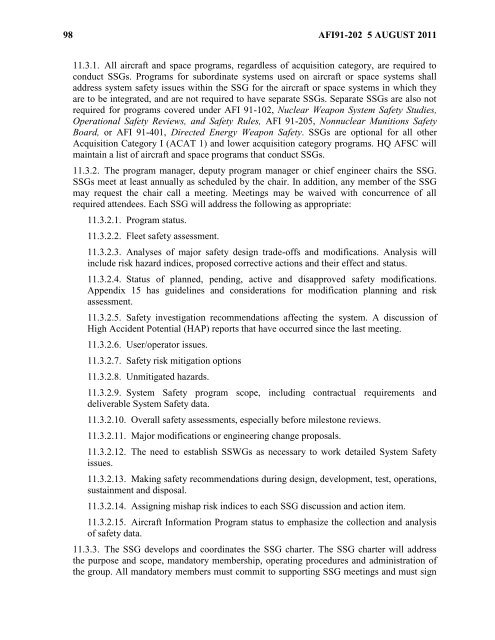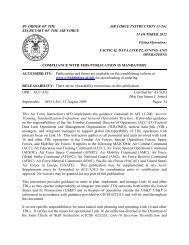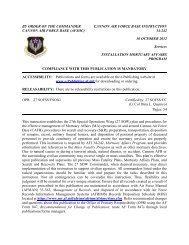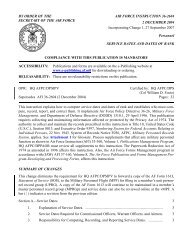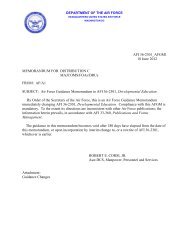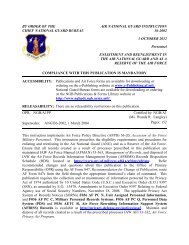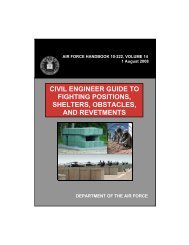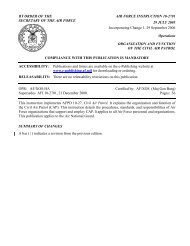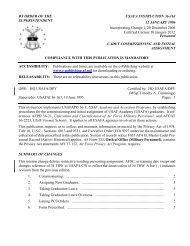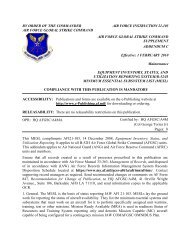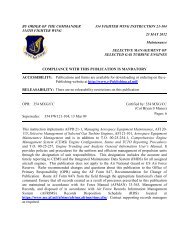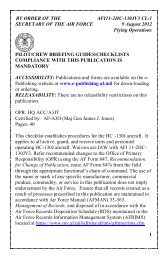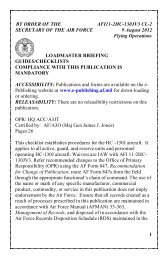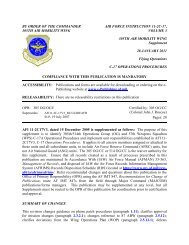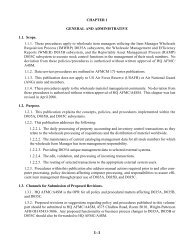MEMORANDUM FOR A1 - Air Force E-Publishing
MEMORANDUM FOR A1 - Air Force E-Publishing
MEMORANDUM FOR A1 - Air Force E-Publishing
Create successful ePaper yourself
Turn your PDF publications into a flip-book with our unique Google optimized e-Paper software.
98 AFI91-202 5 AUGUST 2011<br />
11.3.1. All aircraft and space programs, regardless of acquisition category, are required to<br />
conduct SSGs. Programs for subordinate systems used on aircraft or space systems shall<br />
address system safety issues within the SSG for the aircraft or space systems in which they<br />
are to be integrated, and are not required to have separate SSGs. Separate SSGs are also not<br />
required for programs covered under AFI 91-102, Nuclear Weapon System Safety Studies,<br />
Operational Safety Reviews, and Safety Rules, AFI 91-205, Nonnuclear Munitions Safety<br />
Board, or AFI 91-401, Directed Energy Weapon Safety. SSGs are optional for all other<br />
Acquisition Category I (ACAT 1) and lower acquisition category programs. HQ AFSC will<br />
maintain a list of aircraft and space programs that conduct SSGs.<br />
11.3.2. The program manager, deputy program manager or chief engineer chairs the SSG.<br />
SSGs meet at least annually as scheduled by the chair. In addition, any member of the SSG<br />
may request the chair call a meeting. Meetings may be waived with concurrence of all<br />
required attendees. Each SSG will address the following as appropriate:<br />
11.3.2.1. Program status.<br />
11.3.2.2. Fleet safety assessment.<br />
11.3.2.3. Analyses of major safety design trade-offs and modifications. Analysis will<br />
include risk hazard indices, proposed corrective actions and their effect and status.<br />
11.3.2.4. Status of planned, pending, active and disapproved safety modifications.<br />
Appendix 15 has guidelines and considerations for modification planning and risk<br />
assessment.<br />
11.3.2.5. Safety investigation recommendations affecting the system. A discussion of<br />
High Accident Potential (HAP) reports that have occurred since the last meeting.<br />
11.3.2.6. User/operator issues.<br />
11.3.2.7. Safety risk mitigation options<br />
11.3.2.8. Unmitigated hazards.<br />
11.3.2.9. System Safety program scope, including contractual requirements and<br />
deliverable System Safety data.<br />
11.3.2.10. Overall safety assessments, especially before milestone reviews.<br />
11.3.2.11. Major modifications or engineering change proposals.<br />
11.3.2.12. The need to establish SSWGs as necessary to work detailed System Safety<br />
issues.<br />
11.3.2.13. Making safety recommendations during design, development, test, operations,<br />
sustainment and disposal.<br />
11.3.2.14. Assigning mishap risk indices to each SSG discussion and action item.<br />
11.3.2.15. <strong>Air</strong>craft Information Program status to emphasize the collection and analysis<br />
of safety data.<br />
11.3.3. The SSG develops and coordinates the SSG charter. The SSG charter will address<br />
the purpose and scope, mandatory membership, operating procedures and administration of<br />
the group. All mandatory members must commit to supporting SSG meetings and must sign


